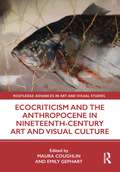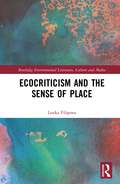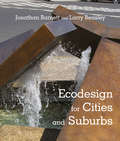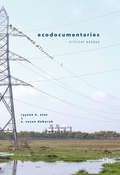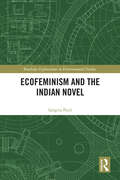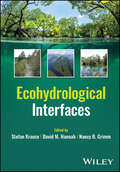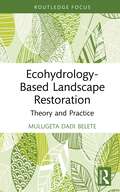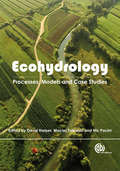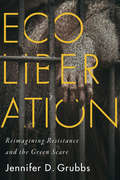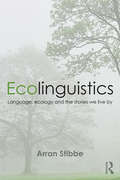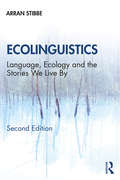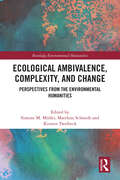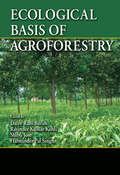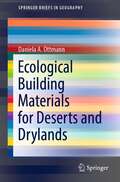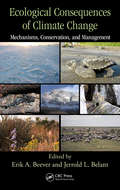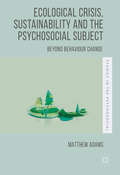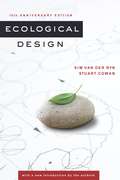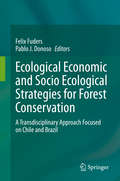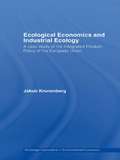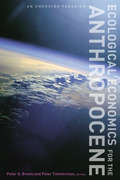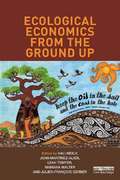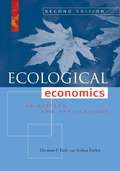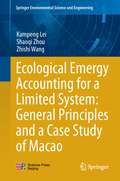- Table View
- List View
Ecocriticism and the Anthropocene in Nineteenth-Century Art and Visual Culture (Routledge Advances in Art and Visual Studies)
by Maura CoughlinIn this volume, emerging and established scholars bring ethical and political concerns for the environment, nonhuman animals and social justice to the study of nineteenth-century visual culture. They draw their theoretical inspiration from the vitality of emerging critical discourses, such as new materialism, ecofeminism, critical animal studies, food studies, object-oriented ontology and affect theory. This timely volume looks back at the early decades of the Anthropocene to query the agency of visual culture to critique, create and maintain more resilient and biologically diverse local and global ecologies.
Ecocriticism and the Sense of Place (Routledge Environmental Literature, Culture and Media)
by Lenka FilipovaThe book is an investigation into the ways in which ideas of place are negotiated, contested and refigured in environmental writing at the turn of the twenty-first century. It focuses on the notion of place as a way of interrogating the socio-political and environmental pressures that have been seen as negatively affecting our environments since the advent of modernity, as well as the solutions that have been given as an antidote to those pressures. Examining a selection of literary representations of place from across the globe, the book illuminates the multilayered and polyvocal ways in which literary works render local and global ecological relations of places. In this way, it problematises more traditional environmentalism and its somewhat essentialised idea of place by intersecting the largely Western discourse of environmental studies with postcolonial and Indigenous studies, thus considering the ways in which forms of emplacement can occur within displacement and dispossession, especially within societies that are dealing with the legacies of colonialism, neocolonial exploitation or international pressure to conform. As such, the work foregrounds the singular processes in which different local/global communities recognise themselves in their diverse approaches to the environment, and gestures towards an environmental politics that is based on an epistemology of contact, connection and difference, and as one, moreover, that recognises its own epistemological limits. This book will appeal to researchers working in the fields of environmental humanities, postcolonial studies, Indigenous studies and comparative literature.
Ecodesign for Cities and Suburbs
by Jonathan Barnett Larry BeasleyAs world population grows, and more people move to cities and suburbs, they place greater stress on the operating system of our whole planet. But urbanization and increasing densities also present our best opportunity for improving sustainability, by transforming urban development into desirable, lower-carbon, compact and walkable communities and business centers. Jonathan Barnett and Larry Beasley seek to demonstrate that a sustainable built and natural environment can be achieved through ecodesign, which integrates the practice of planning and urban design with environmental conservation, through normal business practices and the kinds of capital programs and regulations already in use in most communities. Ecodesign helps adapt the design of our built environment to both a changing climate and a rapidly growing world, creating more desirable places in the process. In six comprehensively illustrated chapters, the authors explain ecodesign concepts, including the importance of preserving and restoring natural systems while also adapting to climate change; minimizing congestion on highways and at airports by making development more compact, and by making it easier to walk, cycle and take trains and mass transit; crafting and managing regulations to insure better placemaking and fulfill consumer preferences, while incentivizing preferred practices; creating an inviting and environmentally responsible public realm from parks to streets to forgotten spaces; and finally how to implement these ecodesign concepts. Throughout the book, the ecodesign framework is demonstrated by innovative practices that are already underway or have been accomplished in many cities and suburbs--from Hammarby Sjöstad in Stockholm to False Creek North in Vancouver to Battery Park City in Manhattan, as well as many smaller-scale examples that can be adopted in any community. Ecodesign thinking is relevant to anyone who has a part in shaping or influencing the future of cities and suburbs - designers, public officials, and politicians.
Ecodocumentaries
by Rayson K. Alex S. Susan DeborahThis book features ten critical essays on ecodocumentaries written by eminent scholars from India, USA, Ireland, Finland and Turkey in the area of ecocinema studies. Situating social documentaries with explicit ecological form and content, the volume takes relational positions on political, cultural and conservational aspects of natures and cultures in various cultural contexts. Documentaries themed around issues such as electronic waste, animal rights, land ethics, pollution of river, land grabbing, development and exotic plants are some of the topics ecocritiqued in this volume.
Ecofeminism and the Indian Novel (Routledge Explorations in Environmental Studies)
by Sangita PatilEcofeminism and the Indian Novel tests the theories of ecofeminism against the background of India’s often different perceptions of environmental problems, challenging the hegemony of Western culture in thinking about human problems. This book moves beyond a simple application of the concepts of ecofeminism, instead explaining the uniqueness of Indian novels as narratives of ecofeminism and how they can contribute to the development of the theory of ecofeminism. In examining a selection of novels, the author argues that Indian texts conceptualize the ecological crisis more as a human problem than as a gender problem. The book proposes that we should think of ecofeminism as ecohumanism instead, seeing human beings and nature as a part of a complex web. Novels analysed within the text include Kamala Markandaya’s Nectar in a Sieve (1954), Shivram Karanth’s Return to Earth (2002) and Na D’Souza’s Dweepa (2013). Ecofeminism and the Indian Novel will be of great interest to students and scholars of ecofeminism, ecocriticism, ecological feminism, environmental humanities, gender studies, ecological humanities, feminist studies and Indian literature.
Ecohydrological Interfaces
by Stefan Krause David M. Hannah Nancy B. GrimmEcohydrological Interfaces Comprehensive overview of the process dynamics and interactions governing ecohydrological interfaces Summarizing the interdisciplinary investigation of ecohydrological interface functioning, Ecohydrological Interfaces advances the understanding of their dynamics across traditional subject boundaries. It offers a detailed explanation of the underlying mechanisms and process interactions governing ecohydrological interface functioning from the micro scale to the ecosystem and regional scale. The multidisciplinary team of authors integrates and synthesises the current understanding of process dynamics at different ecohydrological interfaces to develop a unifying concept of their ecosystem functions. The work introduces novel experimental and model-based methods for characterizing and quantifying ecohydrological interface processes, taking account of innovative sensing and tracing technologies as well as microbial and molecular biology approaches. Key questions addressed in the book include: Which conditions stimulate the transformative nature of ecohydrological interfaces? How are ecohydrological interfaces organized in space and time? How does interface activity propagate from small to large scales? How do ecohydrological interfaces react to environmental change and what is their role in processes of significant societal value? As a research level text on the functionality and performance of ecohydrological interfaces, Ecohydrological Interfaces is primarily aimed at academics and postgraduate researchers. It is also appropriate for university libraries as further reading on a range of geographical, environmental, biological, and engineering topics.
Ecohydrology-Based Landscape Restoration: Theory and Practice (Routledge Focus on Environment and Sustainability)
by Mulugeta Dadi BeleteThis book provides an introduction to a fairly new approach to natural resources management practice entitled ecohydrology-based landscape restoration. Ecohydrology-based landscape restoration integrates landscape restoration practices with ecohydrology science and principles in order to help address the limitations of current management practices in developing countries. Focusing on both the theory and practice of implementing new management practices, the book includes conceptual designs and practical demonstrations for a variety of sites, including hillsides, farmlands, gullies, riparian buffers and wetlands, while also drawing on field research conducted in Ethiopia. The book puts forward principles for improving current practices, which include the better integration of hydrological and ecological concerns, the greater involvement of local communities, the adoption of indigenous practices, the establishment of green and semi-grey infrastructure as an ecohydrological systemic solution and the necessity of taking an adaptive approach to managing landscapes. This book will be of great interest to students and scholars of water resource management, ecohydrology and landscape restoration as well as professionals involved in the restoration of landscapes in developing countries.
Ecohydrology: An Approach to the Sustainable Management of Water Resources
by Maciej Zalewski Nic Pacini David HarperEcohydrology is an emerging new sub-discipline which links elements of ecology with hydrology at all points in the water cycle, ranging in scale from water-plant physiological relationships to whole catchment water-ecosystem processes. This book pays most attention to the larger scales of ecohydrology, emphasizing the use of this tool in striving towards the goal of sustainable water management. Authors from Eastern and Western Europe, America, Australia and South Africa give a broad global context.
Ecoliberation: Reimagining Resistance and the Green Scare (Outspoken)
by Jennifer D. GrubbsDisenchanted by indirect forms of protest designed to work within existing systems of corporate and state power, animal and earth liberation activists have turned instead to direct action. In this detailed ethnographic account Jennifer Grubbs takes the reader inside the complicated, intricate world of these powerful and controversial interventions, nuancing the harrowing realities of political repression with the inspiring, clever ways that activists resist.Grubbs draws on her personal experiences within the movement to offer a thoughtful and intersectional analysis. Tracing the strategies of liberationist activists as they grapple with doing activism under extreme repression, Ecoliberation challenges ubiquitous frameworks that position protestors as either good or bad by showing how activists playfully and confrontationally enact radical social change. Nearly a decade in the making, the book looks back at the notorious period of repression called the Green Scare and draws contemporary connections to the creep of fascism under President Donald Trump.In stories that are simultaneously heartbreaking, riddled with tension and contradiction, and inspiring, Grubbs proves that whether or not the revolution is televised, it will be spectacular.
Ecolinguistics: Language, Ecology and the Stories We Live By
by Arran StibbeThe increasingly rapid destruction of the ecological systems that support life is calling into question some of the fundamental stories that we live by: stories of unlimited economic growth, of consumerism, progress, individualism, success, and the human domination of nature. Ecolinguistics shows how linguistic analysis can help reveal the stories we live by, open them up to question, and contribute to the search for new stories. Bringing together the latest ecolinguistic studies with new theoretical insights and practical analyses, this book charts a new course for ecolinguistics as an engaged form of critical enquiry. Featuring: A framework for understanding the theory of ecolinguistics and applying it practically in real life; Exploration of diverse topics from consumerism in lifestyle magazines to Japanese nature haiku; A comprehensive glossary giving concise descriptions of the linguistic terms used in the book; Discourse analysis of a wide range of texts including newspapers, magazines, advertisements, films, nonfiction books, and visual images. This is essential reading for undergraduates, postgraduates and researchers working in the areas of Discourse Analysis and Language and Ecology.
Ecolinguistics: Language, Ecology and the Stories We Live By (Bloomsbury Advances In Ecolinguistics Ser.)
by Arran StibbeEcolinguistics: Language, Ecology and the Stories We Live By is a ground-breaking book which reveals the stories that underpin unequal and unsustainable societies and searches for inspirational forms of language that can help rebuild a kinder, more ecological world. This new edition has been updated and expanded to bring together the latest ecolinguistic studies with new theoretical insights and practical analyses. The book presents a theoretical framework and practical tools for analysing the key texts which shape the society we live in. The theory is illustrated through examples, including the representation of environmental refugees in the media; the construction of the selfish consumer in economics textbooks; the parallels between climate change denial and coronavirus denial; the erasure of nature in the Sustainable Development Goals; creation myths and how they orient people towards the natural world; and inspirational forms of language in nature writing, Japanese haiku and Native American writing. This edition provides an updated theoretical framework, new example analyses, and an additional chapter on narratives. Accompanied by a free online course with videos, PowerPoints, notes and exercises (www.storiesweliveby.org.uk), as well as a comprehensive glossary, this is essential reading for undergraduates, postgraduates and researchers working in the areas of Discourse Analysis, Environmental Studies and Communication Studies.
Ecological Ambivalence, Complexity, and Change: Perspectives from the Environmental Humanities (Routledge Environmental Humanities)
by Müller, Edited by Simone M.This book provides a systematic, interdisciplinary analysis of the conflicts, issues, and tensions associated with today’s ecological transformation processes from an Environmental Humanities perspective. It explores the notion of ecological ambivalence, where conflicting reactions, beliefs, or feelings toward public policies or private practices for "saving planet Earth" threaten to produce a stalemate.Under the umbrella of the Environmental Humanities, the book brings together scholars from fields such as environmental history, ecological economics, human geography, and ecocriticism. Contributions investigate the dissonances, or ambivalences, wound up with processes of environmental transformation both conceptually and empirically. Case studies range from wind farms in India to green mineral mines in Mexico, and from chemical contamination in Denmark to Rocky Mountain Arsenal in Denver, USA. Additionally, with a focus on creative environmental communication—as in Philippe Squarzoni’s graphic novel Climate Changed or G’Ebinyo Ogbowei’s poetry—contributions also present possible pathways for overcoming ambivalences, managing them creatively, or critiquing the concept as whole. The volume highlights how the humanities, the arts, and the social sciences can work together to help humankind develop and cultivate the skills to overcome paralysis and engage in practical action, and in doing so, puts forth ambivalence as an approach for being in today’s world.This book will be of interest to researchers, academics, and students from the Environmental Humanities, the social sciences, the humanities, and the environmental sciences. It will also be useful for decisionmakers, think tanks, NGOs, and activists.
Ecological Basis of Agroforestry
by Shibu Jose Ravinder Kumar Kohli Harminder Pal Singh Daizy Rani BatishFaced with the growing problems of climate change, ecosystem degradation, declining agricultural productivity, and uncertain food security, modern agricultural scientists look for potential relief in an ancient practice. Agroforestry, if properly designed, can mitigate greenhouse effects, maintain ecosystem health and biodiversity, provide food sec
Ecological Building Materials for Deserts and Drylands (SpringerBriefs in Geography)
by Daniela A. OttmannThis book examines prospective climate adaptive building materials in desert and drylands in the context of climate change, desertification, urbanisation demands, and the consequent sustainable urban development challenges. This preliminary collection of ecological materials covers the characterisation of biotic and abiotic resources for materials, their specifications and benefits for adequate bio-climatic design and construction. Particular emphasis is given to ecological composite materials for advances in desert architecture. Based on the initial collection, the book culminates with potentials for new ecological building materials. The "eComposite Combinator" matrix offers potential research recipes and encourages the reader to conduct further climate-matters related research.
Ecological Climatology
by Gordon BonanThe third edition of Gordon Bonan's comprehensive textbook introduces an interdisciplinary framework to understand the interaction between terrestrial ecosystems and climate change. Ideal for advanced undergraduate and graduate students studying ecology, environmental science, atmospheric science, and geography, it reviews basic meteorological, hydrological, and ecological concepts to examine the physical, chemical, and biological processes by which terrestrial ecosystems affect and are affected by climate. This new edition has been thoroughly updated with new science and references. The scope has been expanded beyond its initial focus on energy, water, and carbon to include reactive gases and aerosols in the atmosphere. The new edition emphasizes the Earth as a system, recognizing interconnections among the planet's physical, chemical, biological, and socioeconomic components, and emphasizing global environmental sustainability. Each chapter contains chapter summaries and review questions, and with over 400 illustrations, including many in color, this textbook will once again be an essential student guide.
Ecological Consequences of Climate Change: Mechanisms, Conservation, and Management
by Jerome Klosowski Jerrold L. BelantContemporary climate change is a crucial management challenge for wildlife scientists, conservation biologists, and ecologists of the 21st century. Climate fingerprints are being detected and documented in the responses of hundreds of wildlife species and numerous ecosystems around the world. To mitigate and accommodate the influences of climate ch
Ecological Crisis, Sustainability and the Psychosocial Subject
by Matthew AdamsThis book draws on recent developments across a range of perspectives including psychoanalysis, narrative studies, social practice theory, posthumanism and trans-species psychology, to establish a radical psychosocial alternative to mainstream understanding of 'environmental problems'. Only by addressing the psychological and social structures maintaining unsustainable societies might we glimpse the possibility of genuinely sustainable future. The challenges posed by the reality of human-caused 'environmental problems' are unprecedented. Understanding how we respond to knowledge of these problems is vital if we are to have a hope of meeting this challenge. Psychology and the social sciences have been drafted in to further this understanding, and inform interventions encouraging sustainable behaviour. However, to date, much of psychology has appeared happy to tinker with individual behaviour change, or encourage minor modifications in the social environment aimed at 'nudging' individual behaviour. As the ecological crisis deepens, it is increasingly recognised that mainstream understandings and interventions are inadequate to the collective threat posed by climate change and related ecological crises.
Ecological Design, Tenth Anniversary Edition: An Ecological Design Retrospective
by Sim Van der Ryn Stuart CowanEcological Design is a landmark volume that helped usher in an exciting new era in green design and sustainability planning. Since its initial publication in 1996, the book has been critically important in sparking dialogue and triggering collaboration across spatial scales and design professions in pursuit of buildings, products, and landscapes with radically decreased environmental impacts. This 10th anniversary edition makes the work available to a new generation of practitioners and thinkers concerned with moving our society onto a more sustainable path. Using examples from architecture, industrial ecology, sustainable agriculture, ecological wastewater treatment, and many other fields, Ecological Design provides a framework for integrating human design with living systems. Drawing on complex systems, ecology, and early examples of green building and design, the book challenges us to go further, creating buildings, infrastructures, and landscapes that are truly restorative rather than merely diminishing the rate at which things are getting worse.
Ecological Economic and Socio Ecological Strategies for Forest Conservation: A Transdisciplinary Approach Focused on Chile and Brazil
by Felix Fuders Pablo J. DonosoThis book proposes strategies for improving the resilience and conservation of temperate forests in South America, such that these forests can provide ecosystem services in a sustainable way. As such it contributes to the design of a resilient human-forest model that takes into account the multiculturalism of local communities, in many cases including aspects of ecological economics, development economics and territorial development planning that are related to indigenous peoples or first nations. Further, it provides proposals for public and territorial policies that improve the state of conservation of native forests and forest ecosystems, based on a critical analysis of the economic factors that lead to the degradation of forest ecosystems in South America today. This edition was conceived by members of the Transdisciplinary Research Center for Social and Ecological Strategies for Sustainable Forest Management in South America at the Universidad Austral de Chile. It includes contributions by distinguished researchers from around the world, combining the fields of economics, ecology, biology, anthropology, sociology and statistics. It is not, however, simply a collection of works written by authors from different disciplines, but rather each chapter is in itself transdisciplinary. This approach makes the book a unique contribution to enhancing social, managerial and political approaches to forestry management, helping to protect forest ecosystem services and make them more sustainable. This, in turn, will benefit local communities and society as a whole, by reducing the negative externalities of forestry management and enhancing future opportunities.
Ecological Economics and Industrial Ecology: A Case Study of the Integrated Product Policy of the European Union (Routledge Explorations In Environmental Economics Ser.)
by Jakub KronenbergHolistic in approach and rooted in the real world Ecological Economics and Industrial Ecology presents a new way of looking at environmental policy; exploring the relationship between ecological economics and industrial ecology.Concentrating on the conceptual background of ecological economics and industrial ecology, this book:provides a selection
Ecological Economics for the Anthropocene
by Peter G. Brown Peter TimmermanEcological Economics for the Anthropocene provides an urgently needed alternative to the long-dominant neoclassical economic paradigm of the free market, which has focused myopically-even fatally-on the boundless production and consumption of goods and services without heed to environmental consequences. The emerging paradigm for ecological economics championed in this new book recenters the field of economics on the fact of the Earth's limitations, requiring a total reconfiguration of the goals of the economy, how we understand the fundamentals of human prosperity, and, ultimately, how we assess humanity's place in the community of beings. Each essay in this volume contributes to an emerging, revolutionary agenda based on the tenets of ecological economics and advances new conceptions of justice, liberty, and the meaning of an ethical life in the era of the Anthropocene. Essays highlight the need to create alternative signals to balance one-dimensional market-price measurements in judging the relationships between the economy and the Earth's life-support systems. In a lively exchange, the authors question whether such ideas as "ecosystem health" and the environmental data that support them are robust enough to inform policy. Essays explain what a taking-it-slow or no-growth approach to economics looks like and explore how to generate the cultural and political will to implement this agenda. This collection represents one of the most sophisticated and realistic strategies for neutralizing the threat of our current economic order, envisioning an Earth-embedded society committed to the commonwealth of life and the security and true prosperity of human society.
Ecological Economics for the Anthropocene: An Emerging Paradigm
by Peter G. Brown Peter Timmerman Eds.Ecological Economics for the Anthropocene provides an urgently needed alternative to the long-dominant neoclassical economic paradigm of the free market, which has focused myopically—even fatally—on the boundless production and consumption of goods and services without heed to environmental consequences. The emerging paradigm for ecological economics championed in this new book recenters the field of economics on the fact of the Earth's limitations, requiring a total reconfiguration of the goals of the economy, how we understand the fundamentals of human prosperity, and, ultimately, how we assess humanity's place in the community of beings.Each essay in this volume contributes to an emerging, revolutionary agenda based on the tenets of ecological economics and advances new conceptions of justice, liberty, and the meaning of an ethical life in the era of the Anthropocene. Essays highlight the need to create alternative signals to balance one-dimensional market-price measurements in judging the relationships between the economy and the Earth's life-support systems. In a lively exchange, the authors question whether such ideas as "ecosystem health" and the environmental data that support them are robust enough to inform policy. Essays explain what a taking-it-slow or no-growth approach to economics looks like and explore how to generate the cultural and political will to implement this agenda. This collection represents one of the most sophisticated and realistic strategies for neutralizing the threat of our current economic order, envisioning an Earth-embedded society committed to the commonwealth of life and the security and true prosperity of human society.
Ecological Economics from the Ground Up
by Julien-François Gerber Hali Healy Joan Martínez-Alier Leah Temper Mariana WalterEcological Economics from the Ground Up takes a unique and much-needed bottom-up approach to teaching ecological economics and political ecology, using case studies that focus on a wide range of internationally relevant topics, to teach the principles, concepts, methods and tools of these fields, which are seen as increasingly important in the context of the current triple social, economic and environmental crisis. This book provides learning materials which are grounded in the experience of Civil Society Organisations (CSOs), with case studies chosen by CSOs and developed collaboratively with leading ecological economists. The case studies come from Europe, India, Latin America, and Africa, and are presented thematically along three lines: 1) social metabolism and accounting methods, 2) institutions and participation, and 3) valuation and environmental policy tools. Core tools, concepts and glossary terms are embedded in topics chosen as a matter of urgency by activist organizations, related to mining and fossil fuel extraction, integrated transport infrastructure development, deforestation and agro-fuel production, sustainable tourism, waste management, wetlands and water management, payments for ecosystem services, natural disasters and hazards, and corporate accountability. Ecological Economics from the Ground Up has been designed to be an accessible learning aid for students of the sustainability sciences and for those CSOs that have recognised the value that ecological economics and political ecology tools and methods hold for their research and advocacy work.
Ecological Economics: Principles And Applications
by Herman E. Daly Joshua FarleyIn its first edition, this book helped to define the emerging field of ecological economics. This new edition surveys the field today. It incorporates all of the latest research findings and grounds economic inquiry in a more robust understanding of human needs and behavior. Humans and ecological systems, it argues, are inextricably bound together in complex and long-misunderstood ways. According to ecological economists, conventional economics does not reflect adequately the value of essential factors like clean air and water, species diversity, and social and generational equity. By excluding biophysical and social systems from their analyses, many conventional economists have overlooked problems of the increasing scale of human impacts and the inequitable distribution of resources. This introductory-level textbook is designed specifically to address this significant flaw in economic thought. The book describes a relatively new “transdiscipline” that incorporates insights from the biological, physical, and social sciences. It provides students with a foundation in traditional neoclassical economic thought, but places that foundation within an interdisciplinary framework that embraces the linkages among economic growth, environmental degradation, and social inequity. In doing so, it presents a revolutionary way of viewing the world. The second edition of Ecological Economics provides a clear, readable, and easy-to-understand overview of a field of study that continues to grow in importance. It remains the only stand-alone textbook that offers a complete explanation of theory and practice in the discipline.
Ecological Emergy Accounting for a Limited System: General Principles and a Case Study of Macao
by Kampeng Lei Shaoqi Zhou Zhishi WangThis book builds on the analyses of Eugene and Howard Odum and introduces the concept of systems ecology. Ecological emergy accounting represents a breakthrough because it allows researchers to integrate man-made capital and natural capital so that human and natural concerns can be addressed using a consistent system of units. This book develops an emergy accounting model that is suitable for describing urban systems, thereby providing a comprehensive picture of those systems. To make the theory concrete, the authors use China's Macao Special Administrative Region as a case study, and compare the results for Macao with those of other urban ecosystems around the world in the fields of ecological economy, tourism, waste treatment, gambling industry, land reclamation and resource consumption etc. Dr. Kampeng Lei is an advisory senior technician at the Environmental Protection Bureau, Government of Macao, China; Shaoqi Zhou is a professor at the College of Environment and Energy, the South China University of Technology, and the Guizhou Academy of Sciences, China; Zhishi Wang is a professor at the Faculty of Science and Technology, the University of Macau, China.
